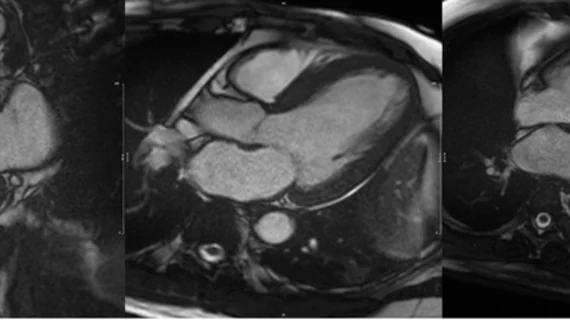Cardiac MRI findings linked with worse outcomes in hypertension patients
Myocardial fibrosis in patients with hypertension could be indicative of future adverse cardiovascular events, such as heart disease, heart failure and death.
A new analysis identified links specific cardiac MRI markers seen in hypertension patients and subsequent adverse events. The likelihood of such consequential events is higher among hypertension patients regardless of whether their blood pressure is well controlled, authors of a first-of-its-kind study recently shared in the journal Hypertension.
“Although anecdotal reports have previously shown the presence of heart muscle scarring in patients with hypertension, this is the first study that confirms the adverse association between scarring of heart muscle and the cardiovascular outcomes in patients with hypertension. We found that heart muscle scarring is a stronger predictor of adverse outcomes even after correcting for patients’ age, sex and systolic blood pressures,” explained lead researcher Calvin Chin, Director of Cardiac Magnetic Resonance Imaging at National Heart Center Singapore, and co-authors.
After examining nearly 800 cardiac MRI scans of patients with known hypertension, the experts observed nonischemic late gadolinium enhancement (LGE) in 18% of patients. These patients were also found to have greater left ventricular mass, worse multi-directional strain and elevated markers of myocardial wall stress and myocardial injury.
Nonischemic LGE was revealed to be independently associated with worse outcomes in hypertension patients.
Clinical Implications:
These markers can improve risk stratification for patients with high blood pressure, in addition to monitoring disease progression and treatment efficacy, the experts said.
More:
Using CMR, a non-invasive tool to detect fibrosis has potential to improve risk-stratification of patients with hypertension. Targeted anti-fibrotic intervention, if proven effective, could have direct impact on clinical practice and help selected patients with hypertension lead better quality of life and have better health outcomes.”
Chin and colleagues are continuing their work by examining the potential to reverse myocardial fibrosis through targeted therapies in patients with hypertension, which will be measured via cardiac MRI scans.
The detailed study is available in full, for free in Hypertension, a journal of the American Heart Association.

